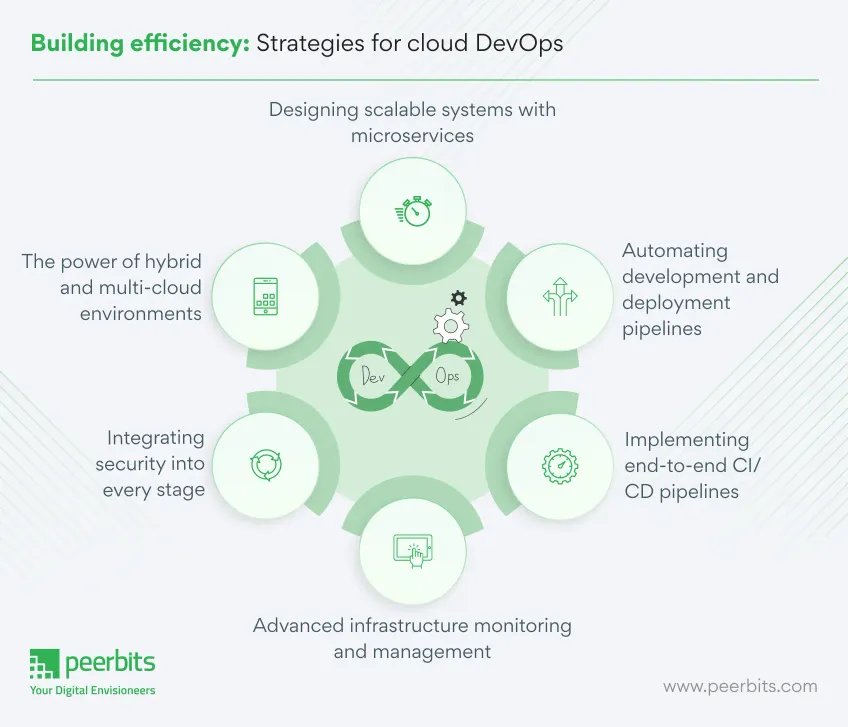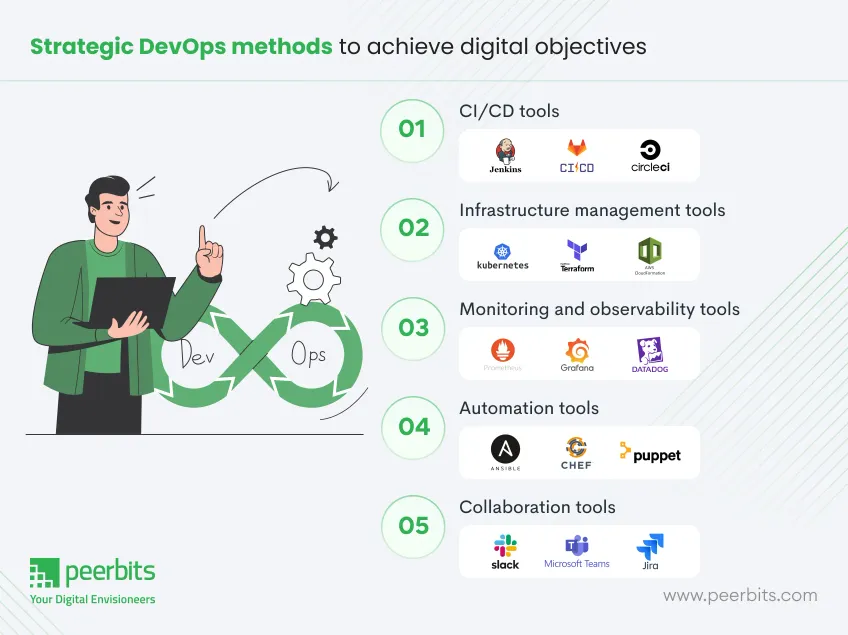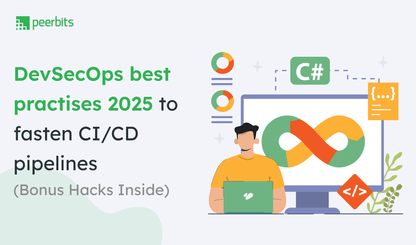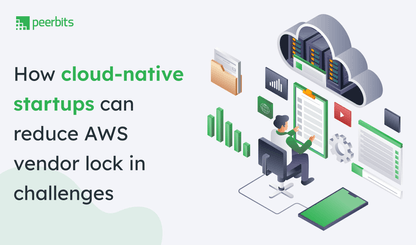DevOps integrates software development and IT operations make the development process smoother and help with continuous delivery. It has become essential in cloud computing, optimizing workflows and enhancing software efficiency.
According to Markets and Markets, the DevOps market is anticipated to grow at a CAGR of 19.7%, from USD 10.4 billion to USD 25.5 billion.
Scalability is crucial for B2B product engineering. As customer demands rise, businesses must scale their operations without sacrificing performance. Cloud-based DevOps offers the flexibility needed to manage this growth effectively.
Cloud-based DevOps boosts agility and performance in B2B businesses. It ensures rapid product updates while maintaining high service availability, helping businesses stay ahead in market.
This blog explores the role of cloud-based DevOps in driving scalable B2B product engineering, highlighting best practices, real-world examples, and the tools that businesses can be utilized for success.
Why B2B product engineering requires cloud-based DevOps?
Managing large-scale B2B projects comes with numerous complexities. These projects often involve multiple teams, complex integrations, and high-performance demands. Cloud-based DevOps offers the agility and flexibility needed to manage these dynamic environments effectively.
Traditional infrastructure and DevOps approaches struggle with scalability and efficiency. Legacy systems are often slow, costly, and difficult to adapt. They also lack the automation and real-time monitoring necessary for optimizing performance.
Cloud-based DevOps addresses these challenges by providing scalable infrastructure, continuous integration, and automation. It improves collaboration, reduces manual errors, and ensures faster product delivery.
This makes it easier for B2B businesses to stay competitive and responsive to market changes.
Benefits of cloud-based DevOps in B2B product engineering
Cloud-based DevOps offers numerous advantages for B2B product engineering it addresses the unique challenges businesses face, boosting efficiency, scalability, and cost optimization.
Here's how cloud-based DevOps can transform your B2B operations.
1. Enhanced collaboration and team productivity
Cloud-native tools facilitate smooth communication and coordination among teams. With integrated platforms, teams can collaborate in real-time, regardless of location. These tools make it easy to track progress and share feedback, which boosts productivity.
Real-time collaboration features let distributed teams work efficiently. Whether across time zones or remote locations, teams can synchronize their efforts without delays.
2. Faster innovation and reduced time-to-market
Cloud-based DevOps accelerates release cycles with CI/CD pipelines the build, test, and deployment processes helps with faster iteration and continuous delivery.
Speed is critical in B2B markets. Companies like Netflix and Spotify rely on rapid updates to stay ahead. Cloud DevOps helps them achieve this agility, providing a competitive edge in market.
3. Dynamic scalability and resource optimization
Cloud environments can easily adapt to fluctuating demands in B2B services. Whether scaling up during high traffic or scaling down during quieter periods, cloud-based DevOps ensures that resources are allocated efficiently to meet real-time needs.
This dynamic scalability helps businesses optimize their infrastructure costs while maintaining performance and service quality.
4. Cost optimization and budget control
Cloud-based DevOps uses pay-as-you-go models, which help control costs. Businesses only pay for the resources they use, avoiding the overhead associated with maintaining on-premise infrastructure.
Efficient use of cloud resources—through automation and optimization—ensures that businesses can maximize their budget while avoiding unnecessary expenses.
5. Improved reliability and disaster recovery
Cloud-based DevOps ensures high availability by using multi-region deployment strategies. This setup reduces the risk of downtime by distributing workloads across different geographic locations.
Effective backup and recovery solutions from cloud providers ensure that businesses can recover quickly from outages. These solutions are automated, reducing human error and ensuring data integrity.
6. Enhanced security and compliance
Compliance is critical when handling sensitive B2B data. Cloud-based DevOps provides built-in features that help businesses comply with industry regulations and standards.
DevSecOps incorporates security from the start, making security practices a part of each phase in the development lifecycle. This method reduces vulnerabilities and helps businesses maintain a secure environment.
Effective srategies to mximize Cloud-based DevOps
Utilizing cloud-based DevOps requires implementing strategies that drive scalability, efficiency, and security. These strategies, from adopting microservices to integrating automation, help businesses optimize their operations and stay competitive in the fast-paced B2B market.

Here's how you can implement them.
1. Designing scalable systems with microservices
Microservices are essential for building scalable B2B solutions. They break down large applications into smaller, manageable components, making it easier to scale as needed.
To transition from monolithic systems to microservices identifying independent modules within their existing architecture. Gradually decouple these modules, ensuring minimal disruption while reaping the benefits of scalability and flexibility.
2. Automating development and deployment pipelines
Automation tools play an important role in simplifying testing and deployment. Tools like Jenkins and GitLab automate these processes, reducing human error and increasing efficiency.
These tools ensure smooth updates and minimize disruptions during deployment. Automation also reduces the time required to release new features and improves the speed of innovation.
3. Implementing end-to-end CI/CD pipelines
Consistency across development, testing, and deployment is crucial for quality assurance. CI/CD pipelines automate the entire process, ensuring that code is tested and deployed smoothly without manual intervention.
This ensures that every release is consistent, reliable, and free of errors, enabling faster time-to-market and a smoother development lifecycle.
4. Advanced infrastructure monitoring and management
AI-based tools can help predict infrastructure needs and optimize performance. These tools analyze system performance, detect potential issues, and proactively recommend solutions before they escalate.
Using predictive monitoring reduces downtime and ensures that infrastructure scales in line with demand, offering both efficiency and cost savings.
5. Integrating security into every stage
Proactive threat detection and mitigation are critical in today’s environment. DevSecOps principles integrate security practices into every stage of the development lifecycle, ensuring that vulnerabilities are identified and addressed early.
Security compliance with regulations like GDPR and HIPAA is also essential. Cloud-based DevOps helps businesses stick to these standards while keeping data secure and protecting customer privacy.
6. The power of hybrid and multi-cloud environments
Combining public and private clouds offers flexibility and scalability. Hybrid and multi-cloud environments let businesses use the best cloud solutions for their needs, optimizing both performance and cost.
Businesses can share resources smoothly across multiple clouds, improving both agility and reliability by following best practices for integration.

Challenges in adopting cloud-based DevOps and solutions
Adopting cloud-based DevOps can come with several challenges, but knowing and addressing them can smooth the transition.
1. Resistance to change in traditional teams
- Traditional teams may resist the shift to cloud-based DevOps due to unfamiliarity or fear of disrupting established workflows.
- Overcoming this resistance requires clear communication about the benefits, along with gradual adoption and support from leadership.
2. Managing costs and resource allocation
- Cloud environments often operate on a pay-as-you-go model, which can lead to unexpected expenses if not carefully managed.
- Implementing cost control mechanisms like automated scaling and monitoring usage can help avoid overspending.
3. Security concerns in cloud environments
- Security is a major concern when migrating to the cloud. Data breaches and unauthorized access are significant risks.
- To reduce these concerns, businesses should implement strong encryption and access controls. Integrating security into every stage of the development lifecycle through DevSecOps practices.
4. Addressing skill gaps with specialized DevOps training
- With the complexity of cloud-based DevOps, skill gaps may arise in teams.
- Offering specialized training and certification programs can help teams develop the expertise needed to effectively manage DevOps processes and cloud infrastructure.
Emerging trends in cloud-based DevOps for B2B
The cloud-based DevOps is developing rapidly with emerging technologies that promise to further transform B2B product engineering.
1. Rise of AI and machine learning for smarter automation
- AI and machine learning are revolutionizing automation by enabling smarter decision-making.
- These technologies analyze vast amounts of data to predict trends, automate repetitive tasks, and optimize workflows, increasing efficiency in the DevOps pipeline.
2. Growth of serverless computing for simplified scalability
- Serverless computing is gaining traction as it simplifies scalability.
- Businesses can scale applications automatically in response to demand, reducing overhead costs and improving resource efficiency.
3. Increasing use of edge computing to reduce latency
- Edge computing is helping businesses bring computation closer to the source of data, reducing latency and improving the speed of applications.
- This is especially beneficial for real-time data processing in B2B environments where milliseconds matter.
4. Expanding role of observability platforms for real-time insights
- Observability platforms are becoming essential in DevOps, offering real-time insights into application performance, user experience, and infrastructure health.
- These platforms provide visibility across the entire system and lets businesses quickly identify issues and improve operational efficiency.
Tools for cloud-based DevOps
A variety of tools are available to enhance the cloud-based DevOps process. These tools streamline tasks, improve collaboration, and ensure scalability and efficiency.

1. CI/CD tools: Jenkins, GitLab CI/CD, CircleCI
CI/CD tools automate code integration and deployment processes, making releases faster and more reliable.
- Jenkins: Offers a flexible automation platform to build, test, and deploy code.
- GitLab CI/CD: Smoothly integrates with Git repositories, enabling automatic code deployment and testing.
- CircleCI: Known for speed and scalability, CircleCI helps optimize the deployment pipeline with efficient workflows.
2. Infrastructure management tools: Kubernetes, Terraform, AWS CloudFormation
These tools simplify infrastructure management and automate resource provisioning.
- Kubernetes: Manages containerized applications, ensuring they run smoothly across multiple environments.
- Terraform: Enables infrastructure as code (IaC), automating the setup of cloud resources with reusable configuration files.
- AWS CloudFormation: Facilitates the creation and management of AWS resources through templated configurations.
3. Monitoring and observability tools: Prometheus, Grafana, Datadog
These tools help track application and system performance, providing insights for proactive management.
- Prometheus: Collects and stores metrics, providing a powerful querying language to monitor system performance.
- Grafana: Visualizes data collected from various sources, enabling real-time monitoring of systems.
- Datadog: Integrates cloud resources for comprehensive monitoring, offering detailed performance dashboards.
4. Automation tools: Ansible, Chef, Puppet
Automation tools enable configuration management and simplify software provisioning and updates.
- Ansible: Focuses on simplicity, automating deployment and configuration tasks through declarative code.
- Chef: Helps manage infrastructure and application configurations with customizable scripts.
- Puppet: Provides automation of server management, ensuring consistent configurations across systems.
5. Collaboration tools: Slack, Microsoft Teams, Jira
These tools improve team communication and project management, enhancing coordination across DevOps teams.
- Slack: Facilitates real-time communication, keeping teams connected and informed.
- Microsoft Teams: Integrates with other Microsoft tools for seamless communication and collaboration.
- Jira: Manages development tasks and tracks progress, ensuring teams stay aligned and meet deadlines.
Conclusion
Cloud-based DevOps offers significant advantages for B2B product engineering and helps businesses achieve scalability, agility, and operational efficiency.
Companies can optimize their development processes and stay competitive in the ever-evolving market by adopting strategies like microservices, automation, and CI/CD pipelines.
With the right tools and approach to security, businesses can overcome common challenges and use emerging trends such as AI, serverless computing, and edge computing to stay ahead.
Integrating cloud-based DevOps into your B2B product engineering strategy not only enhances productivity but also positions your business for long-term growth and success.

FAQ's
Cloud-based DevOps uses cloud environments for development, testing, and deployment processes. This provides scalability, flexibility, and cost-efficiency, while traditional DevOps depends on on-premise infrastructure, which may limit these benefits.
Yes, it’s ideal for businesses of all sizes. Cloud-based DevOps offers pay-as-you-go models, letting small businesses access enterprise-grade tools and resources without heavy upfront costs.
Teams need expertise in CI/CD pipelines, containerization (e.g., Kubernetes, Docker), cloud platforms (AWS, Azure, GCP), and security practices. Continuous learning and specialized training can help bridge skill gaps.
Edge computing processes data closer to the user, reducing latency and enhancing performance for time-sensitive applications. When integrated with cloud-based DevOps, it enables better scalability and faster response times for B2B solutions.
Absolutely. Many cloud providers offer built-in compliance tools for standards like GDPR, HIPAA, and PCI DSS. DevOps workflows can be customized to meet these regulatory requirements through automated audits and monitoring.








